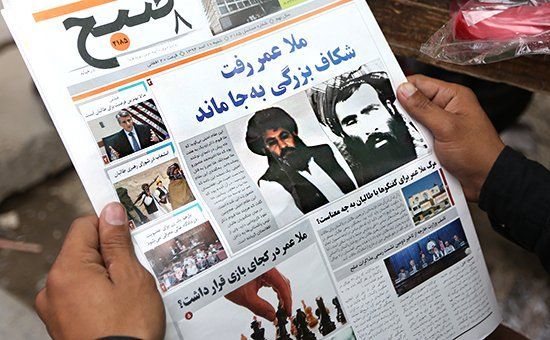 A senior Afghan militant commander has claimed that Russian President Vladimir Putin held an unpublicised meeting with Taliban chief Akhtar Mansour to discuss possible Russian support for the insurgents.
A senior Afghan militant commander has claimed that Russian President Vladimir Putin held an unpublicised meeting with Taliban chief Akhtar Mansour to discuss possible Russian support for the insurgents.
Putin is known to be concerned that Islamic State militants are gaining a foothold in Afghanistan, which borders the former Soviet satellite states of Turkmenistan and Tajikistan.
A Taliban commander said that his group had been promised Russian arms and financial support only weeks before a resurgence in violence that has seen key districts in the southern province of Helmand fall under Taliban control.
Putin is said to have met Mansour over dinner at a late-night meeting on a military base in Tajikistan in September, reported Sunday Times. Press reports indicate that the Russian president was present in Dushanbe, the Tajik capital, on September 14 and 15 to attend a regional counter-terrorism meeting.
A Kremlin spokesman brushed off the suggestion that Putin was there, saying the allegations were “not relevant".
In interviews near Kandahar, two senior militant commanders claimed the Kremlin was backing their insurgency in a bid to make Kabul more dependent on Moscow — as it was after the Soviet invasion of 1979.
Russia's increasing involvement in the region is complicating Western efforts to prop up the Afghan government in the face of relentless insurgent attacks.
International coalition commanders were forced to rush a taskforce of 300 US and British troops to Helmand in the past week to advise Afghan soldiers under siege in the strategic town of Sangin.
The fate of Sangin still hangs in the balance, with Taliban reinforcements flooding in. Claims on Friday by Mohammad Omar Zowak, spokesman for the governor of Helmand, that the security situation was “under control" were disputed by local journalists.
At least 75 per cent of Helmand had been captured by the Taliban, said reporter Mohammad Shafi Aziz: “Only the district centre building is under the control of the government in a few districts of Helmand. Entire districts and villages are under the control of the Taliban."
At his meeting with Mansour, Putin is said to have offered financial support, military training and modern weapons in exchange for the Taliban's cooperation with Russian aims.
The Taliban commander, who claims to have been present, said the Russian leader also insisted that the Taliban step up attacks on former Mujahideen leaders and the Hezb-e-Islami political party led by Gulbuddin Hekmatyar, a sworn enemy of Soviet Russia.
“The Taliban must increase the number of their attacks on the Afghan government in big cities, provinces and big military bases to make the central government weaker," the commander explained.
On Wednesday, Zamir Kabulov, Putin's special representative to Afghanistan, admitted that Russian interests “objectively coincide" with those of the Taliban in the fight against Islamic State and that channels existed for “exchanging information".
Wahid Muzhda, a political analyst and former Taliban official, said Russia revived relations with the Taliban about two years ago, in part over Moscow's concerns about jihadist militants from former Soviet satellite states.
In Afghanistan, the capture of Sangin would be a strategic coup for the Taliban. All but two of Helmand's 14 districts are controlled or fiercely contested by the militants. The insurgency has been funded by the opium trade and supported by disenfranchised locals.
One diplomatic cable revealed that, with an attrition rate of 23 per cent, the Afghan army is now 36,000 troops short and is losing 500 a week.
The scathing assessment points out that corruption has eaten up half of the US-funded $5 billion security bill.
TALIBAN DENY TALKS WITH RUSSIA ON IS
AFP adds: The Taliban have denied they held talks with Russia about countering the spread of Islamic State in Afghanistan, and dismissed the influence of the jihadist group in the country.
The insurgents were responding to a statement Wednesday by senior Russian diplomat Zamir Kabulov, who said his country was exchanging information with the Taliban about the group.
Kabulov, who is a Kremlin special representative in Afghanistan, said Moscow had a shared interest with the Taliban in counteracting the spread of the Islamic State group - also known as Daesh.
We “do not see a need for receiving aid from anyone concerning so-called Daesh and neither have we contacted nor talked with anyone about this issue," the Taliban said in an English-language statement on their website on Sunday.
IS controls large swathes of Syria and Iraq. Fighters in parts of eastern Afghanistan have also proclaimed loyalty to it, challenging the Taliban on their own turf.
Although there are signs that the popularity of IS is growing in Afghanistan, including a radio station that broadcasts Islamic State propaganda every morning, the Taliban remain a far more potent force.
The Taliban in their statement played down reports of an IS presence.
“Some people in Afghanistan are wrongfully taking advantage of the name Daesh while national and international intelligence are also supporting them with the aim of prolonging the occupation," they said. The Taliban said they had “to a large extent uprooted this project", which currently had a presence only in a small corner of a single province.
Source: sundaytimes.com
 В Атырау -10
В Атырау -10